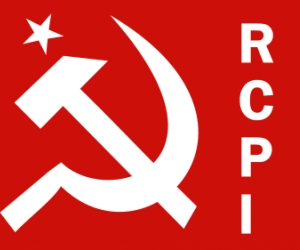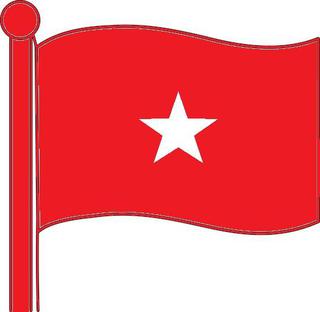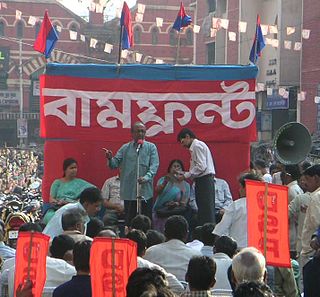The Revolutionary Communist Party of India, also known as RCPI (Das), was a political party in the Indian state of West Bengal, led by Anadi Das.
A political party is an organized group of people, often with common views, who come together to contest elections and hold power in the government. The party agrees on some proposed policies and programmes, with a view to promoting the collective good or furthering their supporters' interests.

West Bengal is an Indian state, located in eastern region of the country on the Bay of Bengal. With over 91 million inhabitants, it is India's fourth-most populous state. It has an area of 88,752 km2 (34,267 sq mi). A part of the ethno-linguistic Bengal region of the Indian subcontinent, it borders Bangladesh in the east, and Nepal and Bhutan in the north. It also borders the Indian states of Odisha, Jharkhand, Bihar, Sikkim, and Assam. The state capital is Kolkata (Calcutta), the seventh-largest city in India, and center of the third-largest metropolitan area in the country. As for geography, West Bengal includes the Darjeeling Himalayan hill region, the Ganges delta, the Rarh region, and the coastal Sundarbans. The main ethnic group are the Bengalis, with Bengali Hindus forming the demographic majority.
Anadi Charan Das was an Indian politician, belonging to the Revolutionary Communist Party of India.
RCPI (Das) emerged as Anadi Das and M. Mokshed Ali, the two members of the West Bengal Legislative Assembly of the Revolutionary Communist Party of India, were expelled from RCPI in July 1969. [1] [2] [3] Ahead of the West Bengal Legislative Assembly election, 1971 the RCPI (Das) joined the Communist Party of India-led Eight Party Coalition. [4] Moreover, RCPI (Das) joined the August Kranti Celebration Committee of seven political parties, which supported the struggle for independence of Bangla Desh. [5]
M. Mokshed Ali was an Indian politician, belonging to the Revolutionary Communist Party of India.

The West Bengal Legislative Assembly is the unicameral legislature of the Indian state of West Bengal. It is Located in the B. B. D. Bagh area of Kolkata (Calcutta)-the Capital of the state. Members of the Legislative assembly are directly elected by the people. The legislative assembly comprises 295 Members of Legislative Assembly, which include 294 members directly elected from single-seat constituencies and one nominated from the Anglo-Indian community. Its term is five years, unless sooner dissolved.

The Revolutionary Communist Party of India is a small political party in India. The party was founded as the Communist League by Saumyendranath Tagore in 1934, breaking away from the Communist Party of India (CPI). RCPI led armed uprisings after the independence of India, but later shifted to parliamentary politics. The party is active in the West Bengal and Assam. The party was represented in the West Bengal Second United Front Cabinet (1969) as well as in various state government during the Left Front rule in the state (1977–2011). In Assam the party won four Legislative Assembly seats in 1978, but its political influence has since declined.
After the 1971 election, RCPI (Das) merged into the RCPI (Tagore). [6] After the death of Tagore, RCPI (Tagore) was split, with Das leading one of the factions and Bibhuti Bhushan Nandi the other. [6]
The Revolutionary Communist Party of India, also known as RCPI (Tagore), was a political party in India, led by Saumyendranath Tagore. RCPI (Tagore) emerged from a split in the Revolutionary Communist Party of India in 1948. RCPI (Tagore) had a very minor role in Indian politics. Tagore served as the chairman of the party. The party published the Bengali fortnightly Ganabani.



